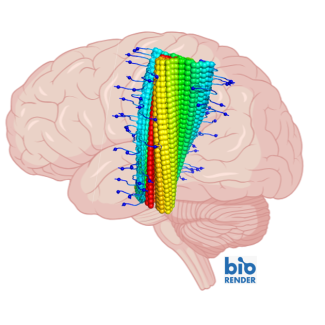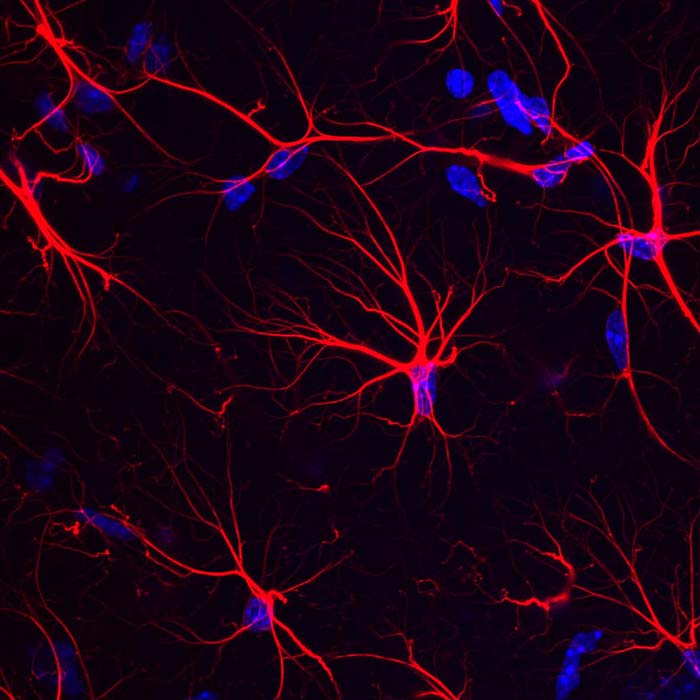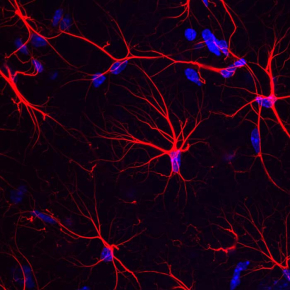
Alzheimer’s: Can an amino acid help to restore memories?
Scientists at the Laboratoire des Maladies Neurodégénératives (CNRS/CEA/Université Paris-Saclay) and the Neurocentre Magendie (INSERM/Université de Bordeaux) have just shown that a metabolic pathway plays a determining role in Alzheimer’s disease’s memory problems. This work, published on 3 March 2020 in Cell Metabolism, also shows that supplying a specific amino acid as a nutritional supplement in a mouse model of Alzheimer’s restores spatial memory affected early. This is a promising path for reducing memory loss related to that disease.
The brain uses a large part of the energy available to our body. To work properly, neurons and the surrounding cells, particularly astrocytes, must cooperate. The early phase of Alzheimer’s disease is characterized by a reduction in this energy metabolism, but until now we did not know whether this deficit contributed directly to the cognitive symptoms of Alzheimer's disease.
A collaborative study has shown in a mouse model of Alzheimer's disease that a decrease in the use of glucose by astrocytes reduces L-serine production. This amino acid is mainly produced by these brain cells and its biosynthesis path is altered in patients. L-serine is the precursor of D-serine, known to stimulate NMDA receptors, essential for brain function and to the establishment of memory. So by producing less L-serine, astrocytes cause reduced activity in these receptors, which alters neuronal plasticity and the associated memorization capacities. Scientists have also demonstrated that memorization functions in mice were restored by supplying nutritional L-serine.
With the identification of the role of L-serine in memory disorders and the experimental efficacy of nutritional supplementation, new strategies appear that may complement medical treatment, to combat early symptoms of Alzheimer's disease and other diseases that display metabolic deficits, like Parkinson’s and Huntington’s. Since L-serine is available as a nutritional supplement, this compound should be rigorously tested in humans, through controlled clinical trials.
This work was conducted by researchers at the Laboratoire des Maladies Neurodégénératives (CNRS/CEA/Université Paris-Saclay), within the MIRCen/Institut de Biologie François Jacob, and the Neurocentre Magendie (INSERM/Université de Bordeaux) in collaboration with teams from the Laboratoire Neurosciences Paris Seine (CNRS/INSERM/Sorbonne Université), the Institut Galien Paris Sud (CNRS/Université Paris Saclay), the Centre de Recherche en Neurosciences de Lyon (CNRS/INSERM/Université Claude Bernard Lyon 1/Université Jean Monnet), the Département Médicaments et Technologies pour la Santé (CEA/INRAE/Université Paris Saclay) and by researchers at AP-HP in the Hôpital de la Pitié-Salpétrière). This work was supported by Association France Alzheimer, Fondation de France, Fondation pour la Recherche Médicale, Fondation Alzheimer and Infrastructure Nationale de Biologie-Santé NeurATRIS.

Impairment of Glycolysis-Derived L-Serine Production in Astrocytes Contributes to Cognitive Deficits in Alzheimer’s Disease. Juliette Le Douce, Marianne Maugard, Julien Veran, Marco Matos, Pierrick Jégo, Pierre-Antoine Vigneron, Emilie Faivre, Xavier Toussay,Michel Vandenberghe, Yaël Balbastre, Juliette Piquet, Elvire Guiot, Nguyet Thuy Tran, Myriam Taverna, Stéphane Marinesco, Ayumi Koyanagi, Shigeki Furuya, Mylène Gaudin-Guerif, Sébastien Goutal, Aurélie Ghettas, Alain Pruvost, Alexis-Pierre Bemelmans, Marie-Claude Gaillard, Karine Cambon, Lev Stimmer, Véronique Sazdovitch, Charles Duyckaerts, Graham Knott, Anne-Sophie Hérard, Thierry Delzescaux, Philippe Hantraye, Emmanuel Brouillet, Bruno Cauli, Stéphane H.R. Oliet, Aude Panatier and Gilles Bonvento. Cell Metabolism, 3 march 2020. DOI : 10.1016/j.cmet.2020.02.004


